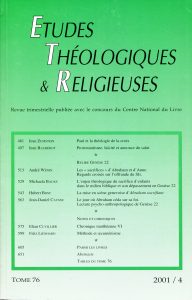Le récit biblique de la ligature d’Isaac pose la question du sens que l’on donne à la fonction paternelle. À partir du bref séminaire du psychanalyste Jacques Lacan sur Les Noms du Père et de son interprétation de la figure d’Abraham en Genèse 22, Jean-Daniel Causse met en lumière les enjeux à la fois anthropologiques et théologiques d’une paternité symbolique qui structure une alliance par le seul lien de la parole. Il montre notamment l’actualité d’Abraham qui devra rituellement consacrer la mort d’une figure archaïque, à la fois ancêtre et dieu, pour que sa propre paternité ne soit pas mainmise sur Isaac mais offre d’une histoire nouvelle à un fils promis à l’avenir.
The biblical story of the binding of Isaac raises a question about the meaning of the paternal function. On the basis of the brief seminar of the psychoanalyst Jacques Lacan about the Names of the Father and of his interpretation of the figure of Abraham in Genesis 22, Jean-Daniel Causse points out the anthropological and theological issues of a symbolical fatherhood that structures an alliance only by the link of the word. He shows notably the ongoing interest of Abraham who must consecrate ritually the death of an archaic figure, which is both ancestor and god, in order that his own fatherhood not dominate Isaac but offer a new history to a son promised to the future.
p. 563-573
Auteur
CAUSSE Jean-Daniel
Jean-Daniel CAUSSE (1962-2018) a été professeur d'éthique à l'Institut protestant de théologie, Faculté de Montpellier, puis professeur au département de psychanalyse de l'université Paul-Valéry Montpellier 3 et directeur du Centre de recherches interdisciplinaires en sciences humaines et sociales (CRISES - EA 4424).
